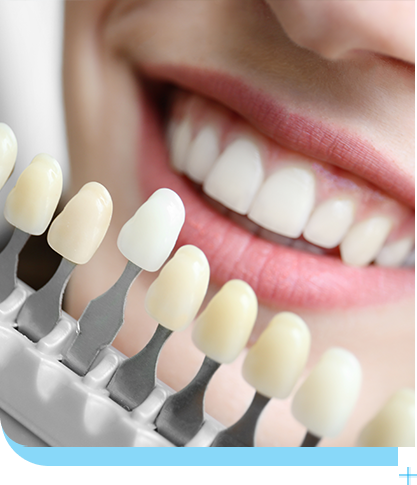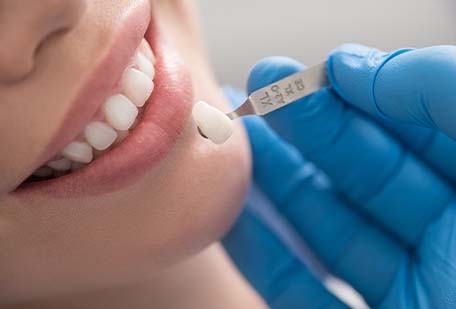Dental Implants
in West Vancouver

Are dental implants for you, and can you receive them? Dental implants can restore your smile, improve oral health and boost self-confidence. While there are many reasons to receive this surgery, you still need to consult a professional to see if it is possible, given your personal situation and oral health needs.
Dental implant surgery replaces a tooth root with screwlike metal posts. Damaged or missing teeth are replaced by artificial ones that function just as well as natural teeth. Dental implants provide a great alternative to bridgework or dentures, which may not fit well for some patients. An implant is also a great option for patients who lack tooth roots, preventing them from receiving bridgework tooth replacements or dentures.
Reasons for dental implants range from preventing teeth from shifting, replacing lost teeth and repairing a pre-existing implant. Advanced clinics like Caufeild Dental can provide implant repair/rescue, surgery, gum grafting and bone grafting, amongst our other services.
Why You Should Consider Dental Implants
Implant dentistry replaces rotten, broken, and missing teeth, eliminating the need for dentures or bridgework. Dental implants are not natural teeth; they are a prosthesis. The implant portion of the procedure involves a small post inserted into the jawbone.
Dental implants provide an anchor for your prosthetic teeth. Some patients feel they look and feel more like natural teeth when compared to dentures. This may be because dentures may not feel secure in the mouth. Dental implants feel more like natural teeth and may look better than dentures.
Our Dental Implant Service at Caulfeild Dental
We conduct the procedure within seven different stages. They involve:
Bridges are either non-removable or fixed prostheses designed to replace a missing tooth or teeth. Teeth on either side of the space anchor the bridge to restore functioning. The materials used are noble alloys, metal fused to porcelain, or porcelain. Porcelain is the most used as it blends naturally with surrounding teeth.
Four types of bridges are available: cantilever, traditional, implant-supported, and Maryland.
- Professional Consultation: A prosthodontic specialist will discuss dental and medical history. They will take digital impressions and use diagnostic imaging. Diagnostic tools examine the quality and quantity of the bone along with the distance between the natural tooth and implant.
- Select Treatment Plan: Your dentist will provide a plan that suits your needs. It may be a bridge, fixed crown, or removable implant-supported dentures. A combination of these solutions may sometimes be recommended.
- Teeth Implantation: At the next appointment, the implant surgery takes place. To start, local anesthesia numbs the jaw. Your dentist then creates a bone slot, and the implant fixture is inserted into the site. It will be closed using a healing cap or healing screw. Sutures tightly close the tissues around the implant.
- Reopening Surgery: Some situations require reopening surgery for implants buried under the tissue. This minor procedure exposes the implant to connect the final crown.
- Impression for Crown: Our technology can scan implants, and a computer designs the crown. A 5-axis milling machine mills the tooth.
- Final Restoration: This step may involve attaching a multiple teeth bridge, single crown, or removable denture.
- Follow-Ups: Dental implant specialists or hygienists recommend following up to maintain the implants.

Types of Dental Implants
Deciding on implants may be a challenging decision. Dentists must consider the number of missing teeth, the surrounding tooth health, the jawbone’s strength, and more. Each implant has a specific function. Here are a few that patients can obtain.
All-On-4 Implants
This is a great way to replace several missing teeth. It provides superior functionality and withstands chewing/biting. With missing teeth, patients tend to have a certain level of bone loss. All-on-4 implants use the most available bone in the jaw to insert the implants. It maximizes bone to prevent additional treatments like expensive and painful bone grafts.
Bridges
Bridges close a gap generated by a missing tooth or when missing multiple teeth. They maintain facial shape and assist in maintaining a natural bite by keeping the artificial teeth where needed. The implanted teeth look good and provide a genuine smile.
Dental bridges can also restore smiles by distributing force exerted by chewing and biting. They keep natural teeth in place while preventing migration. They bond to natural teeth and are alloy, gold, porcelain, or a combination of materials.
Implant Supported Dentures
These combine removable dentures with dental implant stability. It permits specialists to adjust the degree of your dentures, avoiding the need to use specially designed tools. They minimize looseness and painful sores that accompany traditional dentures. Patients do not need denture paste, and some don’t require a plate covering the roof of the mouth.
Dental Crowns
These improve the shape, strength, and function of the tooth. It is a restorative procedure used to repair worn down or broken teeth. It may be used for teeth impacted with tooth decay.
Crowns are durable. They are typically comprised of metal or porcelain. Visually, porcelain crowns closely resemble natural teeth. You may need a partial crown if the tooth lacks the strength to maintain a filling.

The Benefits of Dental Implants
Restore Your Smile
Not every person enjoys the idea of needing a bridge or wearing dentures. Dental implants provide an excellent alternative to this option.
Implants are shaped, sized, and coloured to match your natural teeth. No one will know you have them.
Improve Your Confidence
Patients receiving dental implants can smile confidently, knowing their teeth look natural. Furthermore, unlike dentures, your implants won’t move. You can smile, laugh, and eat your favourite foods without concern that your dental work will pop out.
Improve Bone Strength
Where no teeth exist, bones supporting the teeth atrophy and weaken. Dental implants stimulate new growth, thereby strengthening your bone structure.
After Dental Implants
After you receive dental implants, you can gently brush and floss daily. Also, you will need to protect them from injuries if you play sports. Patients will need to return to ensure the implants remain healthy. You should be able to enjoy them for many years.
Implants feel like natural teeth. The treatment is comfortable despite having a metal post inserted into the bone in your mouth. Advances in dental technology permit us to do implants quickly and with accuracy. There is less downtime during recovery and less discomfort.
Choose Caulfeild Dental for Dental Implants in Vancouver
At Caulfeild Dental, we specialize in restorative dentistry. We can assess your dental situation and provide recommendations that work for you. Our specialists take a personalized approach when dealing with patients. We work with you to provide you with your best options.
Our technology assists us in determining whether this procedure is correct for you and can be done. Our team can handle any situation and will provide suitable recommendations for restoring your smile.
Caulfeild Dental is located at 5311 Headland Drive. We are conveniently situated in Caulfeild Village Shopping Centre, close to the Bank of Montreal. We reside right in the corner beside The Valetor.


